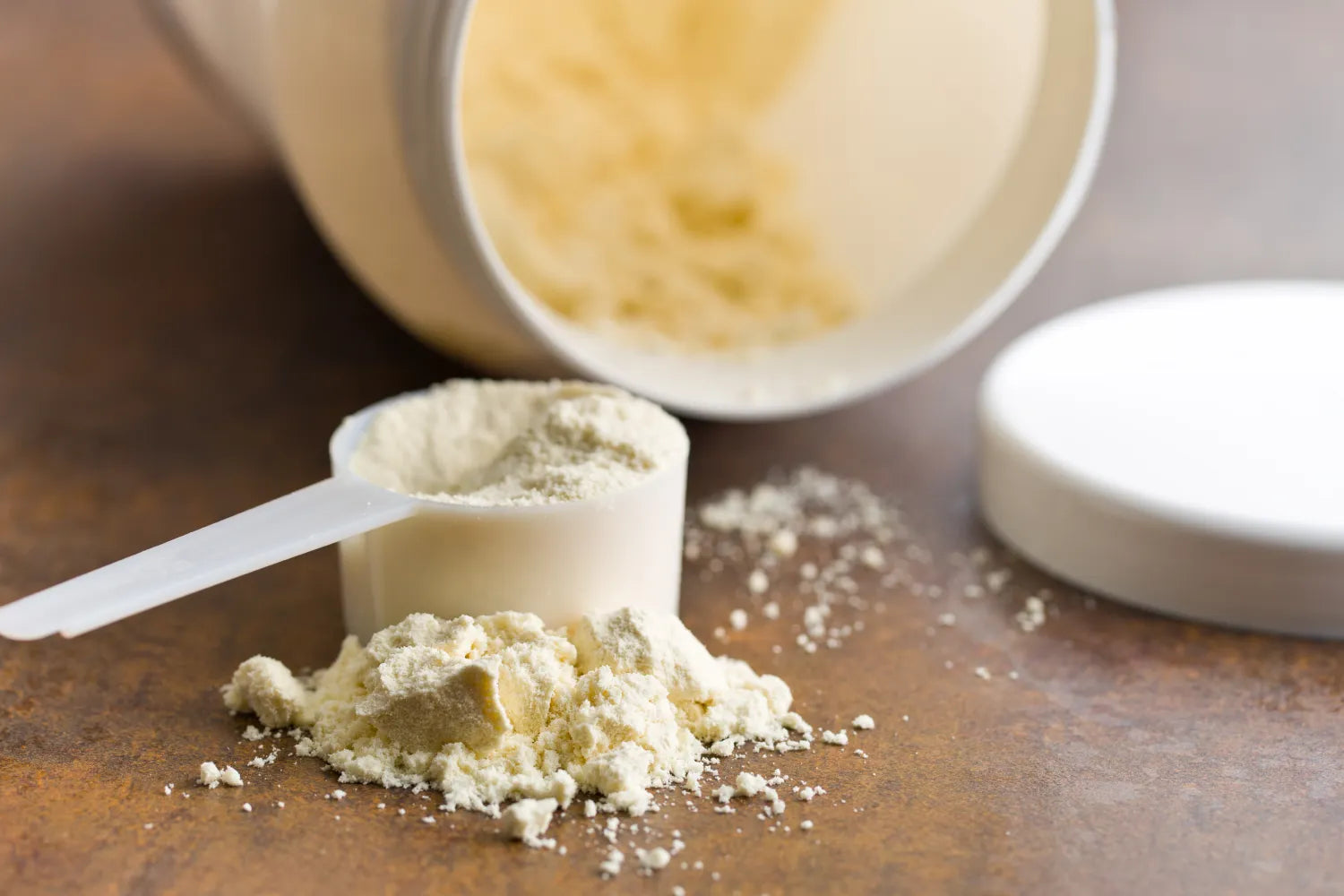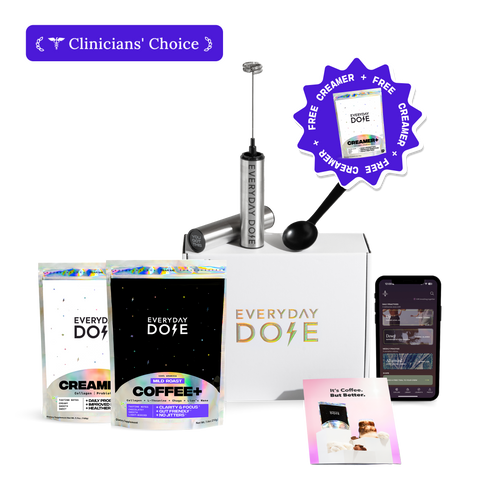Collagen Protein vs. Whey Protein: How To Pick

Whether you’re a casual lifter or a full-on bodybuilder, one of the keys to maintaining your gains is protein. However, when you need to eat up to 1.7 grams of protein per pound of body weight every day, meal planning can get a little tricky.
Getting over a hundred grams of protein a day is hard enough, but it’s especially hard when you’re also trying to limit your carb intake. This is why many avid gym-goers drink protein shakes after their workouts.
There are many different kinds of protein powders you can buy, including whey protein and collagen protein. But what are the differences between these two proteins, and which one is best for you? Follow along to find out.
What Is Collagen Protein?
Collagen is the most common protein in the human body. It’s in your skin, muscles, bones, tendons, and even in your gut lining. Naturally occurring collagen works in the body to provide structure. It helps your organs, blood vessels, and muscles maintain their shape without deflating.
The five main types of collagen include:
- Type I: This is the most abundant form of collagen and can be found in bones, tendons, and ligaments.
- Type II: This type of collagen can be found in the joints.
- Type III: This type of collagen is in muscles, organs, and blood vessels.
- Type IV: This type of collagen makes up different layers of the skin.
- Type V: This type of collagen is found in the eyes, skin, and hair.
Collagen protein supplements are made by extracting collagen from the tissues of animals such as cattle, fish, pigs, and chickens. It is possible to buy vegan collagen made from bacteria, but it may not provide the same benefits.
What Is Whey Protein?
Whey is one of the proteins present in milk. Milk contains about 20 percent whey protein and 80 percent casein, as well as water, sugars, and vitamins.
When milk curdles and is turned into cheese, the casein-infused curds are separated from the whey-infused liquid. To make whey protein powder, these proteins are extracted from the liquid and turned into powder. Usually, this powder is also flavored and sweetened.
What Are the Differences Between Collagen and Whey Protein?
When you’re blending up your post-gym protein shake, you might be wondering which is best: collagen or whey protein. Ultimately, they both have their own pros and cons, and it’s up to you to pick one that suits your needs. Here are some of the main differences between collagen and whey protein.
Purpose
Whey protein is incredibly high in leucine, an amino acid that plays an important role in muscle growth. In fact, whey is one of the highest sources of leucine compared to sources like beef, eggs, and beans, coming in at 15 percent leucine.
Naturally, this makes whey protein specifically gifted when it comes to building muscle. However, it’s not just about the leucine content. Studies have shown that a whey protein supplement is better than leucine at supporting extended muscular growth.
On the other hand, collagen is lower in leucine, so it doesn’t affect muscle building as much as whey protein does. It can support muscle growth, just not on the same level as a whey protein supplement.
That said, collagen has a few tricks up its sleeve. Because it contains non-essential amino acids like glycine and proline, collagen can help support the walls of your intestines and the tiny villi that help move food through the digestive tract. This can help with nutrient absorption and digestion.
Collagen can also support joint health, especially if you experience joint discomfort every now and then. Collagen can also encourage healthy-looking hair, skin, and nails.
Amino Acid
There are nine amino acids that your body cannot make on its own, which means you must get them through your diet. These are called essential amino acids.
The nine essential amino acids include:
- Phenylalanine: Gets metabolized into dopamine and epinephrine.
- Valine: Supports energy production and muscle maintenance.
- Threonine: Supports the immune system and weight loss.
- Tryptophan: Gets metabolized into serotonin, which controls sleep and mood.
- Methionine: Supports detoxification and mineral absorption.
- Leucine: Supports bodily repair, muscle growth, and healthy blood sugar levels.
- Isoleucine: Supports the breakdown of muscles.
- Lysine: Supports hormone production and overall health.
- Histidine: Gets metabolized into histamine, which supports brain health, digestion, and sleep.
Foods that contain all nine essential amino acids are called complete proteins. Whey protein is a complete protein, while collagen is missing tryptophan. However, tryptophan is easily found in daily diet staples like cheese, chicken, turkey, egg whites, fish, and milk.
How To Use Collagen Protein
Using whey protein is pretty straightforward — it’s made to be blended up with milk and other ingredients like bananas or peanut butter to create a shake. However, where most whey protein is flavored to taste good on its own, many collagen supplements are unflavored.
This can be both a blessing and a curse. On the one hand, it makes it easy to incorporate collagen into smoothies and other recipes you already enjoy. On the other hand, you’ll definitely want to mix it in with something, because it won’t taste like anything on its own.
Of course, you can also opt to try a mix that already has collagen in it, like our Mushroom Coffee+ blend. This blend features grass-fed bovine collagen along with coffee extract to provide a rich coffee taste. Most of us love a good cup of joe, so why not drink coffee with extra benefits?
Our blend also includes lion’s mane mushroom, which can help support a balanced gut environment and encourage mental focus. It also features chaga mushroom, which contains plenty of prebiotic fibers to support gut health, and L-theanine, which can encourage feelings of relaxation and support quick thinking.
The Bottom Line
Collagen and whey might both be sources of protein, but they’re a bit different when it comes to their benefits. Whey is a complete protein that is particularly suited for muscle growth, which makes it a great option for anyone looking to maximize their gains. On the other hand, collagen is an incomplete protein that can help support gut health, joint health, and skin health.
As with all sources of animal protein, the quality of your supplement is only as good as the way it’s developed. That’s why we use grass-fed Brazilian bovine collagen in our mushroom coffee and matcha blends. To learn more about our ingredients, visit the Everyday Dose blog today.
Sources:
PROTEIN INTAKE FOR OPTIMAL MUSCLE MAINTENANCE | ACSM
What is the benefit of collagen in your diet? | Gundersen Health System
Leucine concentrations of various protein sources. Differentiation is... | ResearchGate
Start your day
The Right Way









